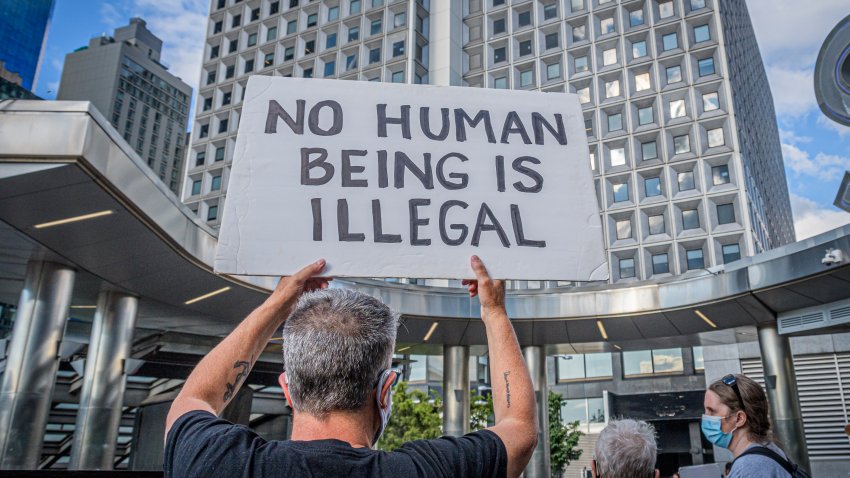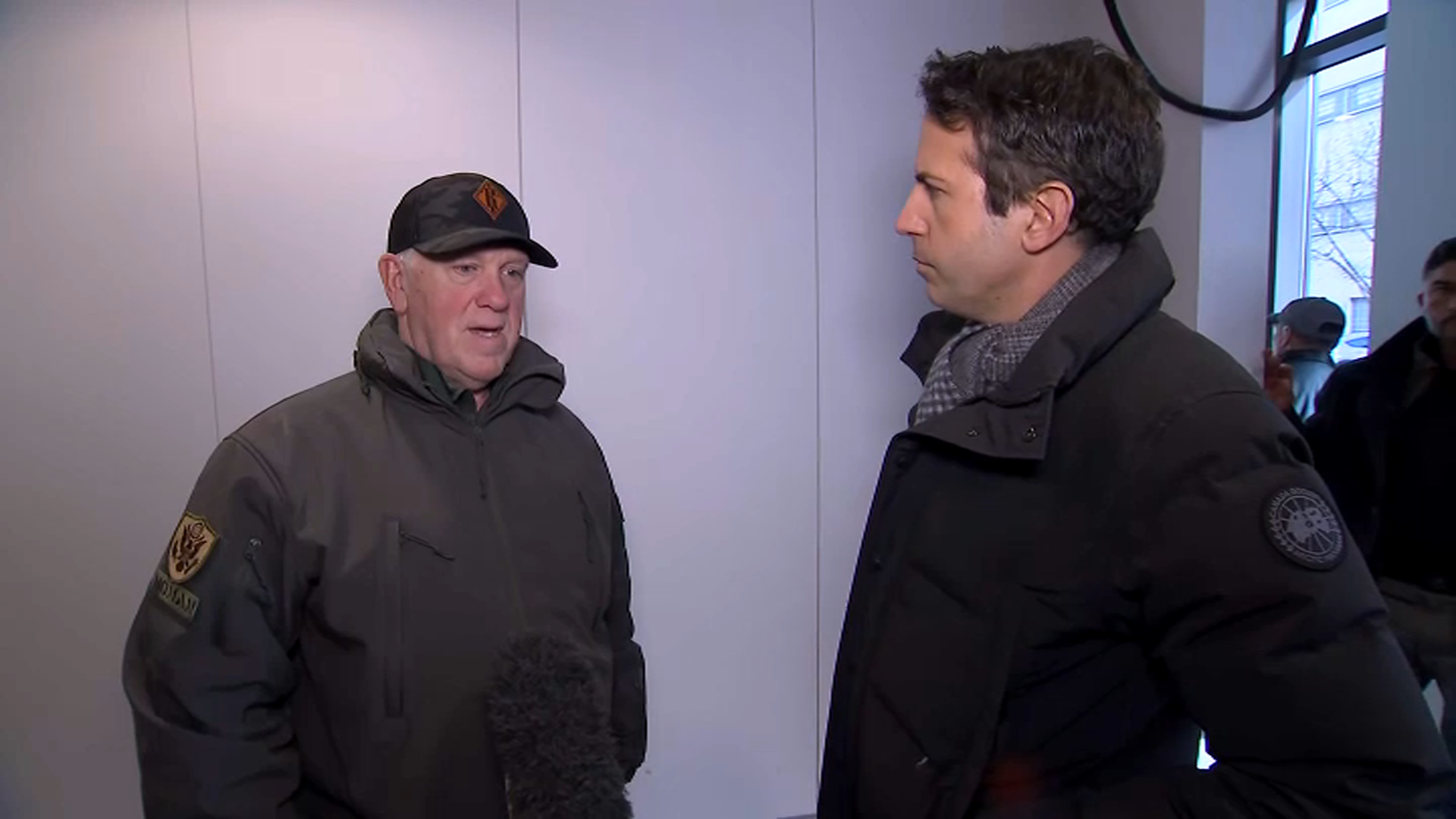You’re watching the NBC 5 Chicago News streaming channel, which plays local Chicago news 24 hours a day, seven days a week. You can find the “NBC 5 Chicago News” streaming channel on your phone or computer, and on Peacock, Samsung, Roku, Xumo or on our app, so you can watch our local news on your schedule.
Enhanced immigration enforcement operations were reported in Chicago and parts of Illinois starting on Sunday and were expected to continue through the week as federal agencies touted arrests around the country.
But who are immigration officials focused on in the operations?
The sheer number of federal agencies involved showed President Donald Trump's willingness to use federal law enforcement beyond the Department of Homeland Security to carry out his long-promised mass deportations, though few specifics have been released so far.
Here's a look at what we know as the situation continues to unfold:
What is happening in Chicago?
Heightened operations are expected to continue Monday and through the week as top Trump administration officials, including “border czar” Tom Homan and the acting deputy attorney general, visited Chicago on Sunday to witness the start of increased arrests and crackdowns.
Since Trump took office, similar immigration enforcement operations have been publicized around the country, which U.S. Immigration and Customs Enforcement says are ongoing. Social media posts from other DEA and Homeland Security offices noted additional weekend operations in at least Arizona, California, Colorado, Georgia, Nebraska and Texas.
A source familiar with the operations told NBC News there were roughly 10 teams with about 10 federal agents each across Chicago Monday.
Trump had promised mass deportations of “millions and millions” of people during his presidency. The Trump administration has not publicly said how many immigration detention beds it needs to achieve its goals, or what the cost will be. An estimated 11.7 million undocumented people are living in the U.S., according to the Centers for Migration Studies.
Immigrant rights groups have tried to prepare for the aggressive crackdown with campaigns for immigrants to know their rights in case of an arrest. Chicago officials have done the same, publishing similar information at public bus and train stations.
Feeling out of the loop? We'll catch you up on the Chicago news you need to know. Sign up for the weekly Chicago Catch-Up newsletter.
On Friday, Chicago Public Schools officials mistakenly believed ICE agents had come to a city elementary school and put out statements to that effect before learning the agents were from the Secret Service.
On Saturday, several Chicago-based immigrant rights groups filed a lawsuit against ICE, seeking an injunction prohibiting certain types of immigration raids in Chicago.
“Immigrant communities who have called Chicago their home for decades are scared,” said Antonio Gutierrez from Organized Communities Against Deportation, one of the plaintiffs. “We refuse to live in fear and will fight any attempts to roll back the work we’ve done to keep families together.”
How many arrests were made?
Immigration and Customs Enforcement said it made 956 arrests nationwide on Sunday and 286 on Saturday. It wasn't immediately clear how many of those arrested were in Illinois.
Some of the operations may not have been unusual, however.
ICE averaged 311 daily arrests in the fiscal year that ended Sept. 30 under the Biden administration.
Who is ICE targeting?
The agency has offered few specifics, saying "U.S. Immigration and Customs Enforcement, along with federal partners, including the FBI, ATF, DEA, CBP and the U.S. Marshals Service, began conducting enhanced targeted operations [Sunday] in Chicago to enforce U.S. immigration law and preserve public safety and national security by keeping potentially dangerous criminal aliens out of our communities."
Previous reports had indicated the operations would primarily target migrants with criminal backgrounds, though there were concerns migrants without a criminal history could be arrested as well.
Trump’s border czar, Tom Homan, told NBC News on Sunday among the undocumented arrested in Chicago, six were convicted of serious offenses, along with several gang members and two convicted of murder and aggravated sexual battery. He noted, however, that collateral arrests, or detentions of people without criminal convictions who were present during the raids, was possible.
That was the case in Newark, New Jersey, last week as ICE agents showed up at a business for what the mayor said was a warrantless raid, where they detained three “undocumented residents” as well as some U.S. citizens. Officials said one person was questioned even after showing military identification.
Illinois Gov. J.B. Pritzker, a frequent Trump critic, questioned the aggressive approach of the operations and the chilling effect for others, particularly for law-abiding immigrants who have been in the country for years.
“We need to get rid of the violent criminals. But we also need to protect people, at least the residents of Illinois and all across the nation, who are just doing what we hope that immigrants will do,” Pritzker said Sunday on CNN’s “State of the Union.”

Who is making the arrests?
Acting Deputy Attorney General Emil Bove said he observed immigration agents from the DHS along with agents from the FBI, Drug Enforcement Administration and the Bureau of Alcohol, Tobacco, Firearms and Explosives. He didn’t offer details on the operation, which came days after DHS expanded immigration authority to agencies in the Department of Justice, including the DEA and ATF.
“We will support everyone at the federal, state, and local levels who joins this critical mission to take back our communities,” Bove said in a statement. “We will use all available tools to address obstruction and other unlawful impediments to our efforts to protect the homeland. Most importantly, we will not rest until the work is done.”
The DEA’s Chicago office posted pictures on X showing Bove and Homan with agents from ATF and Customs and Border Protection.
Chicago has some of the strongest sanctuary protections, which bar cooperation between city police and immigration agents and the Illinois Trust Act limits Illinois law enforcement's ability to work with federal immigration authorities.
The Trump administration said Friday that it was expanding the use of “expedited removal” authority so it can be used across the country starting right away.
“The effect of this change will be to enhance national security and public safety — while reducing government costs — by facilitating prompt immigration determinations,” the administration said in a notice in the Federal Register outlining the new rules.
“Expedited removal” gives enforcement agencies broad authority to deport people without requiring them to appear before an immigration judge. There are limited exceptions, including if they express fear of returning home and pass an initial screening interview for asylum.
Groups that fall under the Department of Homeland Security include:
- U.S. Citizenship and Immigration Services (USCIS)
- U.S. Coast Guard (USCG)
- U.S. Customs and Border Protection (CBP)
- Cybersecurity and Infrastructure Security Agency (CISA)
- Federal Emergency Management Agency (FEMA)
- U.S. Immigration and Customs Enforcement (ICE)
- Transportation Security Agency (TSA)
- U.S. Secret Service (USSS)



